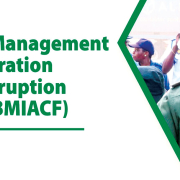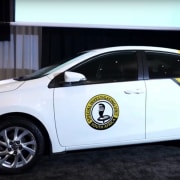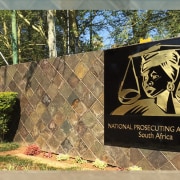|
Getting your Trinity Audio player ready...
|
There is a new anti-corruption task team (ACTT) in town, it means business and South Africans just have to keep watching this space.
Delegates at the official international anti-corruption day event, held to mark the worldwide initiative and hosted by the government in Tshwane on Monday, 10 December, were told of a newly rejuvenated ACTT process that enjoys political will and leadership for the first time in years. Consequence management, whistle-blower and witness protection, and the media’s role in covering corruption also came into the spotlight.
Clear strategy
Investigating corruption, and getting those involved to pay for their crimes, is complex and takes time, and the public needs to understand that.
But with the nearly completed national anti-corruption strategy (Nacs) – conceptualised within the framework of the National Development Plan – government’s multi-agency approach to tackling corruption, long criticised for its complex makeup, will work better than before, according to heads of its anti-corruption agencies. Members of the public were reminded, however, that it is not only the work of government that will achieve this task for South Africa, but a collective effort that starts with the individual acting ethically, and holding state institutions accountable, will deliver results.
Special Investigating Unit (SIU) head Andy Mothibi said although his team continues to follow the same process in identifying cases to investigate and then pitching them to the president through the justice department, the feedback path will change going forward. “Part of what we all want is the impact following an investigation, and that impact can only be seen and observed in the carrying out of recommendations that we make,” he said. “Disciplinary processes that are recommended as part of our final report, for instance, get sent to the relevant departments, and what the president has decided in the quest for consequence management, is to send out all SIU reports to state institutions for feedback that includes progress on disciplinary processes.”
In the past year, said Mothibi, the SIU surpassed their own target of R1.3-billion for asset recovery. They have managed to put R2.7-billion back into the government purse.
The Hawks, said head Godfrey Lebeya, are also beefing up their structures, having recently filled two posts of provincial heads that had been vacant for some time. “We are in the process of rebuilding the unit to the status that we would like to see it. That means capacity in terms of both numbers and expertise.” The goal, he said, is to fill just under 300 positions. By the end of the year they will have advertised more senior posts within the unit, which they hope to fill early next year.
The gaps in senior management in the Hawks, according to the National Prosecuting Authority’s Nomvula Mokhatla, has given them countless challenges. Her team of prosecutors in the asset forfeiture unit needs to work closely with competent investigators to close cases, many of which are complex. She stressed the importance of collaboration among agencies, which maximises the use of government resources and ensures that all systems work well together.
Whistle-blower protection
Public protector Busi Mkhwebane, in her address, said a critical part of the journey of fighting corruption is the whistle-blower. “Whistle-blowers are real champions we can use to fight corruption, but it is unfortunate that there is a big price for them to pay, as a lot of them face serious challenges.”
Her office has received a large number of complaints from whistle-blowers who cite victimisation within their workplace as a concern. A case in point, said Mkhwebane, was that of a whistle-blower who exposed maladministration within the KwaZulu-Natal treasury in 2016 and was victimised and subsequently dismissed. “We found that her dismissal was unfair and that she should be reinstated.”
Another case was that of the CEO of Kusasa who was victimised by the board for having uncovered irregularities in the state’s digital migration programme. Through the intervention of Mkhwebane’s office, the board was dissolved and he was reinstated.
Although her office covered the procedural inadequacies that led to the whistle-blowers’ dismissals, and ensured reinstatement, not all whistle-blowers are so lucky enough to be cleared.
Doing their country duty
Former Limpopo education department official Solly Tshitangano and the son of the late North West union leader Moss Phakwe, Tlholo, were also present to elaborate on the ordeals whistle-blowers face. While Tshitangano gave the audience a sense of the technical processes that wrongdoers employ to get rid of whistle-blowers like himself from public office, Phakwe expressed the emotional and financial impact on his family following the murder of his father in 2009.
Tshitangano exposed corruption in his department’s textbook procurement process, where a company called EduSolutions was paid hundreds of millions, despite not having delivered on the product, as per their contract. Even though he alerted the relevant authorities within the department upon finding out in 2009, it was not until the department – along with several others in the province – was placed under national treasury administration, that the matter was picked up.
With the investigation under the national spotlight, Tshitangano was no longer safe, and thus began his victimisation and ultimate removal from the department. He is now with National Treasury.
Moss Phakoe’s journey ended in death on 14 March 2009. He was an ANC councillor in the Rustenburg municipality and had exposed corruption within its structure that implicated mayor Matthew Wolmarans. Tlholo Phakoe spoke of the pain felt by his family, which still has not come to terms with his death, particularly because the men who were arrested, tried and sentenced for his father’s murder are now free. “I honour invites to such events because I’d rather fail in a cause that will ultimately succeed, than succeed in a cause that will ultimately fail.”
The elder Phakoe exhausted all avenues within his party in his efforts to hold Wolmarans accountable, with no success. He was murdered in his driveway, before any action had been taken by the ANC in response to the dossier he had compiled as evidence against Wolmarans. The former mayor and his bodyguard, Enoch Matshaba – who was tried as the triggerman – were both acquitted a year after being sentenced, following the recanting of evidence by one of the witnesses in the case.
“If ever the ANC needed a reason for why corruption should be dealt with through the criminal justice system, and not through some comradely political solution behind closed doors, the dead body of my father is that reason.”
He added that whistle-blowing in South Africa is clearly a very risky and dangerous game.
Whistle-blowers must be protected
Dawoo Adam, the recently retired head of the country’s witness protection programme, appealed to the different agencies as well as the media to prioritise witness and whistle-blower safety and security in their handling of cases. By law, said Adam, the identities of people on the programme cannot be disclosed, not even to the media.
“The mechanism that is in place to allow people to blow the whistle has serious gaps,” he said, adding that his former unit’s covert operations are stretched in terms of resources, with only nine officers across the country. Adam added that South Africa has the best witness protection legislation in the world, which covers processes like commissions, which operate outside the justice system, but a lot more still needs to be done.
“It is not easy to investigate corruption related matters. They are complex.” He appealed to those in the investigative functions of anti-corruption agencies to be vigilant and aim to protect the whistle-blower in their journey.
Delegates ended the proceedings by taking a pledge to act ethically and hold others accountable at all times.








